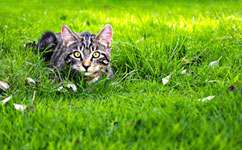Cats could be more harmful to birds than previously suspected, scientists discover

The study, by researchers at the universities of Sheffield and Exeter, suggests that killing birds is just a small part of the problem cats cause our feathered friends.
Instead, the mere sight of a cat near their nests makes blackbirds feed their chicks less often. Not just that, but the shrieks the adult birds make trying to defend their nests end up attracting other predators like crows, magpies and rooks, exacerbating their plight.
The only real way to stop their most damaging effects on the UK's ailing bird population is to keep them indoors permanently. But researchers concede this is likely to be problematic.
Scientists have long suspected that such indirect effects may have a bigger effect on birds than cats killing them alone do.
So, with the latest State of the UK's Birds survey suggesting that the nation's bird population has dropped from 210 million in 1966 to 166 million in 2012, Dr Colin Bonnington from the University of Sheffield and colleagues decided to test these so-called sub-lethal effects. These drive animals to change their behaviour, often in an effort to reduce their chances of being eaten.
Bonnington put a stuffed cat, grey squirrel or rabbit near to blackbird nests for just 15 minutes, and recorded the parents' behaviour.
He found that adult blackbirds were much more likely to call in alarm when they spotted the cat compared with the squirrel or the rabbit models. They were also more aggressive towards the cat model when they had older chicks in the nest.
'This supports the parental investment theory, which predicts that parents should invest more in older rather than younger chicks,' says Dr Karl Evans from the University of Sheffield, the study's principal investigator.
And when faced with the cat model, adult birds fed their chicks much less frequently for at least an hour and half after seeing the cat model. Previous studies suggest that cutting their food intake by this much, if sustained, could lead to a huge 40 per cent drop in the chicks' growth rates.
This is the first time researchers have shown these indirect effects on bird populations and may help explain the drop in bird numbers over the last 40 years.
Cats are one of the commonest predators of birds, certainly in towns and cities. Indeed cats are now so widespread that their numbers can exceed 1500 per square kilometre.
'There is potential to lessen the impact of cats on birds by keeping cats inside more often. But this needs to be balanced against other interests,' says Evans.
He acknowledges that this won't be easy.
'In North America, more than half of cat owners keep their cats indoors, because they're afraid of their pets being run over by cars, or getting into fights with other cats. But in the UK, only three in a 100 cat owners do, which suggests there are likely to be strong cultural barriers against this,' says Evans.
'It's imperative that assessments of the impact of predators on prey take these indirect effects into account, otherwise we're unlikely to design control strategies as effectively as possible,' he adds.
Evans is keen to point out that while the study demonstrated that cats affect bird behaviour, it didn't reveal any influence on the size of bird populations.
'Cats may just be changing the cause of mortality,' he says.
The study was published in the Journal of Applied Ecology and was funded by the Natural Environment Research Council.
More information: Bonnington, C. et al., Fearing the feline: domestic cats reduce avian fecundity through trait-mediated indirect effects that increase nest predation by other species, Journal of Applied Ecology 2013, 50, 15-24, doi: 10.1111/1365-2664.12025
Journal information: Journal of Applied Ecology
Provided by PlanetEarth Online
This story is republished courtesy of Planet Earth online, a free, companion website to the award-winning magazine Planet Earth published and funded by the Natural Environment Research Council (NERC).
















